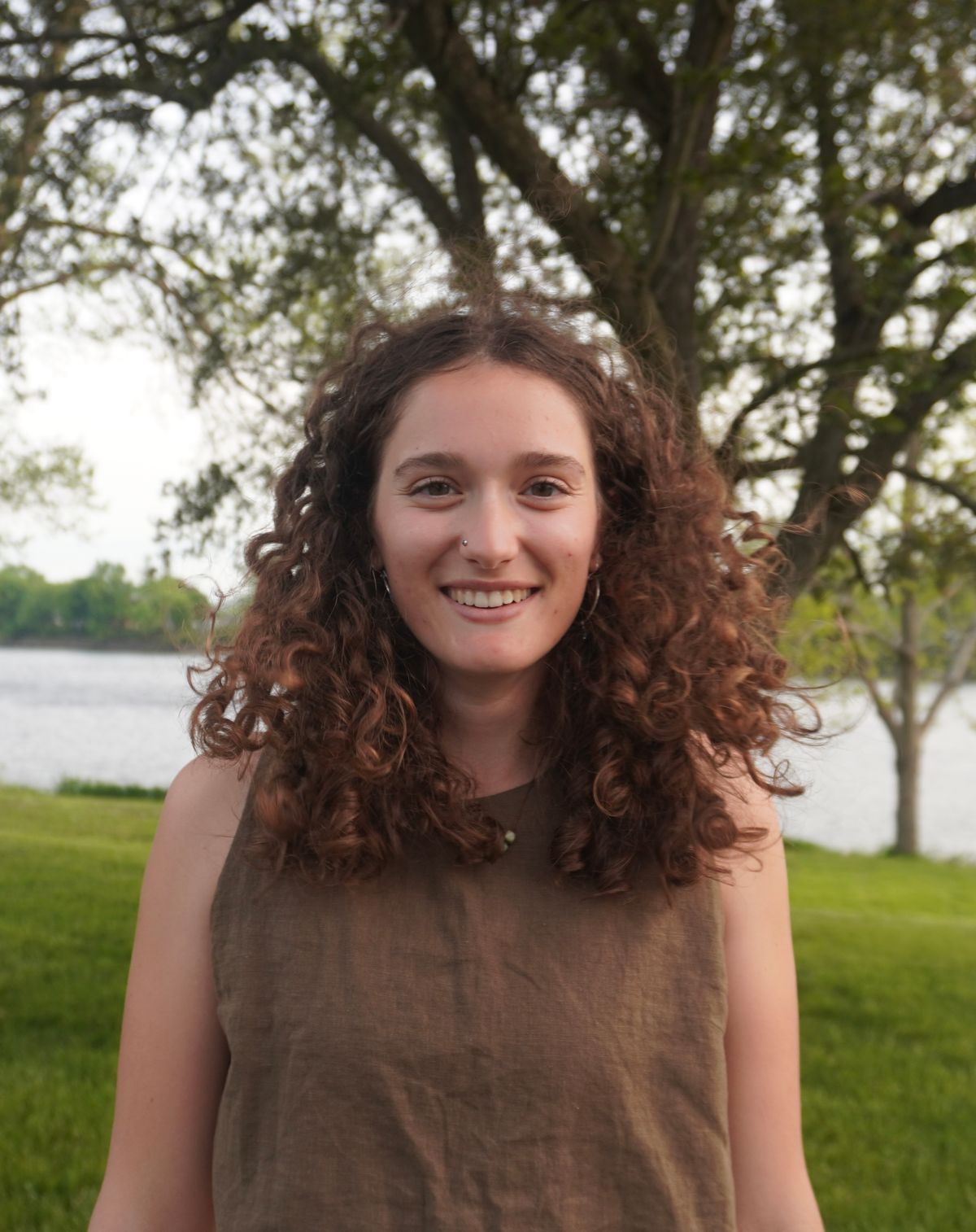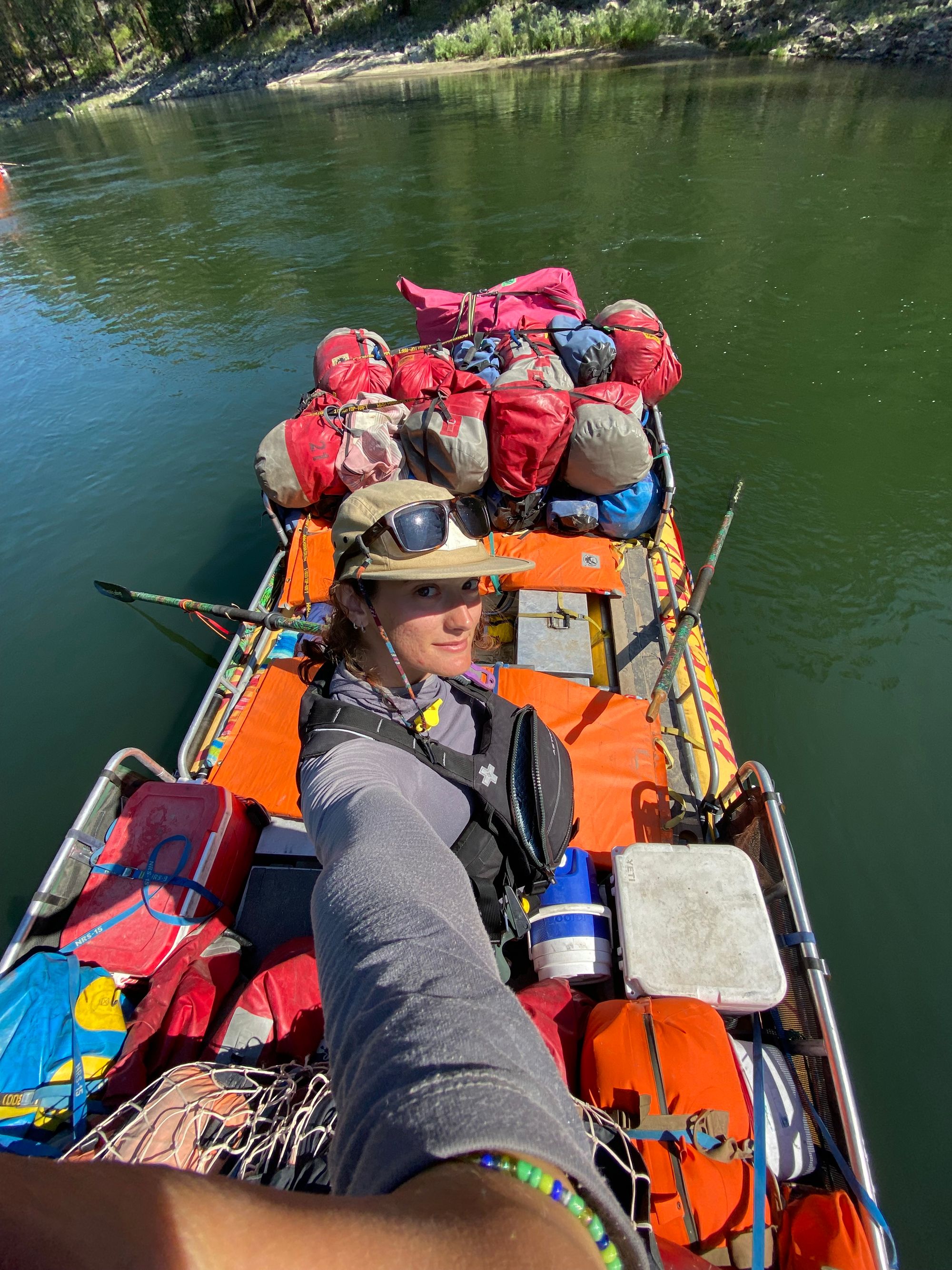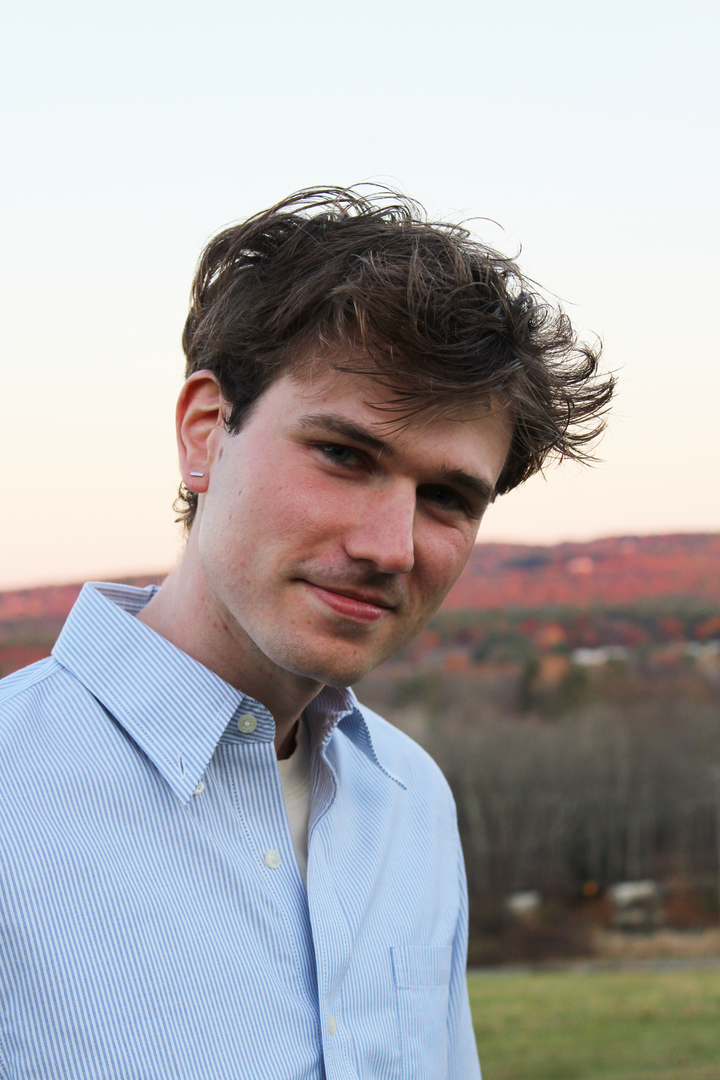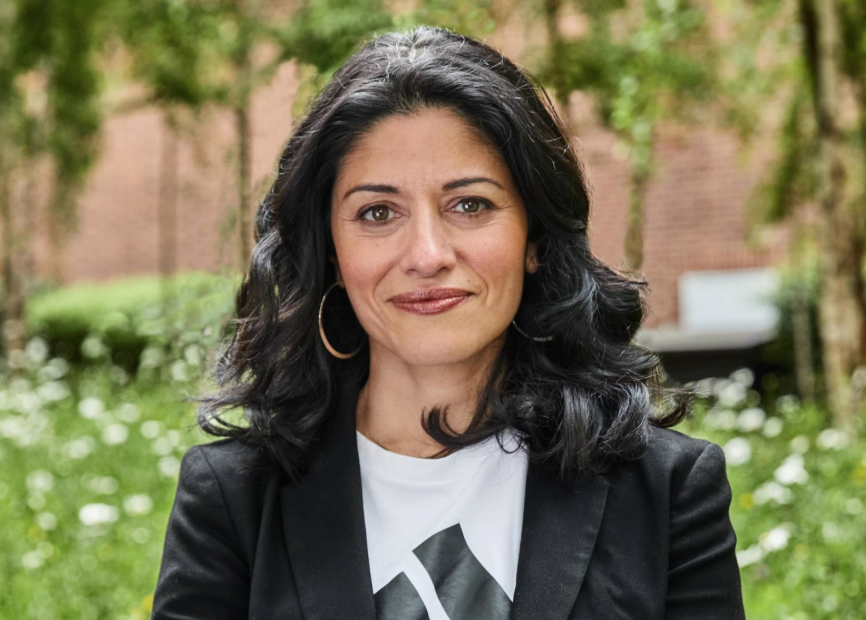Anna Penner: The River Guide Crossing Communities
Whether it be rowing, skiing, or completing a thesis on the Great Salt Lake, Penner is well-known for her steadfast attitude and the enthusiasm she brings to the people around her.

When I first met Anna Penner ’24 at an interest meeting for Amherst’s Crew team in the fall of 2023, I realized that she could instantly connect with people, even with those who had few common interests. She was one of the few team members to talk to us prospective rowers, telling us how much the team had changed her life with infectious enthusiasm. Though her teammate was worried that Penner was making us uncomfortable, we weren’t. Rather, it was relaxing to meet someone both curious about meeting new people and excited to talk about her commitments.
As the season started a few weeks later, I listened as laughter and conversation filled the bus rides traveling to and from the boathouse, whether it be anxiety about an upcoming regatta or the terrible weather we had to endure on the water that day. There were inside jokes about Bill Stekl (our varsity coach), hungry guesses for what dinner was that night, and even makeshift bus sing-alongs.
I remember one ride back, where Penner asked me how my experience on the team was thus far — an effort only a few had made that early into the season. At the time, I was (unfortunately) too exhausted to answer and soon fell asleep. But it was clear to me then, and it still is now, that Penner does her best to create a tight community within the team: part of the crew’s lengthy Instagram post highlighting her achievements reads: “Anna brings her positivity and dedication to the team and everything else she does, inspiring us ALL to be better rowers and participants in the world.”
Listening to her under clear skies in front of Frost Library, I soon understood not only why she’d chosen the outdoors for an interview, but the extent of her contributions beyond just the crew team: she’s a river guide, skier, bikepacker; an environmental studies and history double major with a thesis on the Great Salt Lake in Utah; and she briefly served on the AAS and even wrote for The Student’s features section.
It seems Penner has reached and benefited many places during her time here at Amherst. Or, as Economics and Environmental Studies Professor Katherine Sims put it in an email, “Whether she is rowing a boat at high speed, organizing an outing club trip, designing a survey on Sanctuary Land Use, or investigating the political ecology of the Great Salt Lake, Anna brings her infectious enthusiasm and ability to lead by doing wherever she goes.”
A (Sick) Gap Year
Hailing from Salt Lake, Utah, Penner has always been involved with her community. In high school, she was part of the mountain biking, swim, and cross country teams; the editor in chief of her yearbook; and participated in rallies for the March For Our Lives movement.
She also skied often, because her family had an extensive history with the sport: “Both my parent’s [families] … moved [to Salt Lake] for skiing,” she explained. “My grandpa [on my mother’s side] worked at the hospital there … then my dad moved there after high school … drove out [in his] broken down Volkswagen Beetle, and moved to Salt Lake to work … as a maid at a ski resort — just to ski.” That would explain her commitment as Chair of the Ski and Snowboarding Club at Amherst, the member who, as Penner described it, “... organized most of the recreational trips … [If] you get an email being like, ‘oh, we’re running a trip to Berkshire East, like, sign up,’ that’s all me.”
Penner graduated from West High School in 2019, and given her extensive history with outdoor activities, it’s no surprise that she took a gap year to travel the world before attending college — her two main choices being between Amherst and Dartmouth. “[When] it was the night before decisions … I flipped a coin. And I landed on Dartmouth … I was like, ‘I can’t do it … it’s not right.’ Dartmouth has a really big outdoors community, which makes a lot of sense for me. But I really wanted to push myself to see … how I could continue to be a part of the outdoors … [even] when I didn’t have access to what might have felt a little bit more comfortable.”
After spending the summer post-graduation in Utah, Penner flew to New Zealand to meet her family friends, where she learned about bikepacking, a sport that’s stuck with her since. Then she traveled to Italy to work as an au pair as part of a cultural exchange program in a ski town, taking care of one child. “He was this horrible eight year old,” she joked, laughing. Penner intended to spend all of March 2020 traveling around Europe and made it to Paris, when Covid-19 forced governments to start shutting down their borders. After returning to Italy to retrieve her belongings, she boarded a flight to the United States, returning home just as the latter country shut down.
Stuck in Utah, where the mandates were less strict, Penner and her family biked and skied with another family, creating “a little bubble.” She spent the remaining time of her gap year bikepacking 1,800 miles from the Montana border down to New Mexico with her sister and another friend. “It was incredible,” Penner said, reminiscing about the trip. “And we just biked for six weeks straight across the desert and mountains. I’m hoping one day I’ll be able to finish the route because it starts in Banff [a town in Canada].”
Finding a Path
With so many interests tied to nature, a double major between environmental studies and history seems self-explanatory, yet Penner’s academic journey wasn’t originally solidified. “I remember every single week [during freshman year], I had a different combination of majors. I was like, ‘I’m going to do economics and art history.’ … Then I’d say, ‘you know what, I’m actually going to do geology and math.’ I had no idea what I was going to do.”
It wasn’t until she took Associate Professor of Sociology and Environmental Studies Hannah Holloman’s class, “Unequal Footprints of The Earth,” that she committed to an academic discipline. “[Professor Holloman’s course] was an incredible class. I think that was where I really was pushed to think about where I was from [as well as] my impact on the planet.”
On top of the critical thinking that her classes encouraged, Penner pursued an environmental studies major because she would be able to attend classes in many different disciplines, as opposed to being limited to one — a testament to Amherst’s liberal arts education. “As [an environmental studies] major I’ve had to take geology. I’ve had to take economics. I’ve had to take stats. I’ve had to take history. I’ve had to take political science. I’ve had to take so many different disciplines to [think about the] overarching issue of climate change.”
When asked about her history double major, Penner explained she loves environmental history and the way it impacts how we see today’s world. “I don’t think you can talk about where we are right now without understanding how we got there.”
Her interest in her two majors led her to study abroad in Thailand during the Fall of 2022, where she pursued a sustainable development studies program based in Chiang Mai. Classes functioned in a block program, where students took one course at a time, lasting a couple of weeks each.” On top of classes, the program also had a field research component, where she and her classmates traveled around Thailand interviewing locals to learn about sustainable development. They then put together a research presentation, showcasing their findings.
At this point, our conversation fell quiet for just a moment. Penner quickly filled the silence with a funny story: “I ate a rat while I was there. It wasn’t great. It was pretty bitter.” When I asked her to elaborate, she told me how she had asked her host parents if the rat was a mushroom, mispronouncing “mushroom” as “spicy” in Thai: “[They] were like, ‘oh, it’s not spicy. Do you want it?’ I was like, ‘Okay,’ so I ate it, thinking it’s a mushroom.” Penner laughed, before continuing. “That wasn’t a mushroom. It was definitely the rat [they] had been cooking earlier that morning.”
On the Salt Lake
Reflecting on her time in Thailand, Penner believed she learned the most from traveling the country and interviewing different people. “[That] was part of how I knew how to do interviewing for my thesis.”
Penner’s thesis focuses on her home region, specifically the shrinking size of the Great Salt Lake. It analyzes the lake’s history and the different sociological forces that have affected and still affect the body of water today. Her first chapter recounts the effect The Church of Latter Day Saints (LDS) had on the nearby region. “[When] the LDS church came … they said, ‘We want to build the kingdom here. We can’t do that without controlling the land, [and we] can’t do that without controlling the water.’”
Penner conducted about 20 interviews for the later parts of her thesis, which involves understanding the current movements trying to save the lake. “I spoke with activists, I spoke with politicians, I spoke with nonprofit people, educators, lots of different people,” she said. “I learned that people are really confined by the current legal system around water … so there’s [even] a lawsuit that I wrote about.”
The final portion of her thesis is what she called, “speculative fiction,” where she tried to predict what the lake’s future would look like depending on what decisions are made, considering that current solutions aren’t enough to raise the water elevation to 4,198 feet — the minimum height required for the lake to be considered healthy.
Penner’s thesis cumulated in over a year of work — a study and acknowledgement of a place dear to her heart. She has called it “the thing that [she’s] the most proud of walking away from here.”

Looking Back and Heading Forward
When I interviewed Penner’s friend, Naviya Kapadia ’24, she, among other things, described Penner as “focused, silly, and loving.” And when asked if Penner was popular on campus, Kapadia, nodding, answered with a smile. “[Penner] touches many lives.”
Listening to Penner describe notable stories she had here at Amherst, I could see why Kapadia chose to describe her friend that way. Penner first told me about the sophomore year prom that she helped plan: “[The prom] was really fun; it was in front of a science center … everyone dressed up and people wore full prom attire — it was really cute … I feel like it came at a moment when we [were] really trying to rebuild.”
She then mentioned her three-person special topics class with President Michael Elliot, where her final project was about the Sabrina Statue. In pursuing her research, Penner was able to talk to the current owner and reveal past efforts made to recover the statue. Her findings were published earlier this May in The Student.
Penner also mentioned the rowing team’s contribution to her time at Amherst. “I often joke that rowing is the only thing that got me through Amherst, but in a lot of ways, it’s not a joke,” she said. Joining the crew team her freshman year meant “sitting on the rowing machines, under a tent outside of the gym with masks on doing four by 10 minutes at steady state.” Crew was the only sport she felt comfortable as a walk-on, and she has never regretted it since. “I would say the rowing team is my other main accomplishment. And to compete with Premier New England teams as an entire club team is awesome. That’s so special.”
“It’s nice,” Penner said about the close connections she has with her team. “You don’t want to ask the same questions [after graduation], like ‘How are you? How’s it going?’ … I feel like those questions feel kind of silly. So it’s nice to have something that’s really concrete to connect with people … like, ‘I’m going to be at this regatta…are you coming this year?’”
Returning to the present day, she told me about her friend, Gillian Richard ’24, who performed at the Intersections dance performance; then about the victories the women’s team had at the New England Rowing Championships (NERC) — Penner’s boat won first place. Talking about these recent successes, she said, “I’m just really proud of how much work so many of my classmates have put into building back communities that we weren’t a part of before we got here … I’m really proud to be part of a year that invested so much in making the school better, coming into it not knowing what we were missing.”
Since her start at Amherst, Penner has spent every summer as a river guide at Idaho’s Main Salmon River — and considering her commitment to the crew team, it’s not difficult to see why. After graduating, she plans to continue her job as a river guide over the summer, an occupation which she describes as incredibly difficult. So much so, that it makes Amherst feel somewhat easy: “I feel like guiding is so hard. It’s so much work. But honestly, it makes the rest of the world like easy mode.”
After working as a river guide, Penner plans to work for the upcoming election later this year — with the hopes of taking the LSAT as well. Speaking about her long term goals, she said, “I’d like to do a Juris Doctor (JD) and Masters of Public Policy joint degree in the next couple of years.” And when asked whether she intended to work in environmental law, she admitted that she didn’t know what field she ultimately wanted to work in. “But that’s part of why I want to do a joint degree [in law and public policy]. I’d love to be able to … think pretty critically about where the gaps are in legislation.”
Wherever her interests take her, it goes without a doubt that Penner will bring her unwavering resolve and vibrant enthusiasm. And while many of the lives she’s touched may mourn her departure, in a way Penner will have never left them, because she will always be remembered.
In the words of the women’s crew team on Instagram, “[Penner has] taught us to smile, catch quick, and handle the world with grace. In times where we might have felt left out, she’s brought us in.”





Comments ()